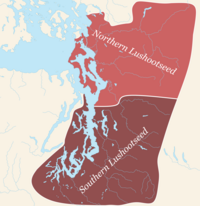Nisqually Indian Tribe of the Nisqually Reservation
This article needs additional citations for verification. (June 2024) |
| Total population | |
|---|---|
| 650 enrolled members[1] | |
| Regions with significant populations | |
| Languages | |
| English, Nisqually[2] | |
| Religion | |
| traditional tribal religion, Indian Shaker Church[3] | |
| Related ethnic groups | |
| other Nisqually people |
The Nisqually Indian Tribe of the Nisqually Reservation is a federally recognized tribe of Nisqually people. They are a Coast Salish people of Indigenous peoples of the Pacific Northwest. Their tribe is located in the State of Washington.
Some of the people of Nisqually descent are enrolled in the Confederated Tribes of the Chehalis Reservation but neither tribe allows a Nisqually to be enrolled in both tribes at the same time.
Reservation
[edit]The Nisqually Reservation is 1,000-acres large and located in Thurston County, Washington, 15 miles east of Olympia. All of the current reservation land was acquired by the tribe in the last 25 years.[4]
The reservation was established by the Treaty of Medicine Creek of 1854. Originally 5,105 acres, the reservation was mostly east of the Nisqually River in Pierce County, Washington. The tribal lands were broken into individual allotments in 1884.[citation needed] In 1917, Pierce County, through the process of condemnation proceedings (eminent domain), took 3,370 acres (14 km²) for the Fort Lewis Military Reserve.[citation needed]
Government
[edit]The Nisqually Indian Tribe is headquartered in Olympia, Washington. They ratified their constitution and bylaws on September 9, 1946. These were amended on October 28, 1994. The tribe is governed by a seven-member, democratically elected General Council. The current tribal administration is as follows:
• Chairman: Ken Choke
• Vice Chairman: Antonette Squally
• Secretary: Jackie Whittington
• Treasurer: Norine Wells
• Fifth Council Member: Chris Olin
• Sixth Council Member: Guido Levy, Jr.
• Seventh Council Member: Leighanna Scott
Language
[edit]English is commonly spoken on by the tribe. Their traditional language is the Nisqually language, which is a Southern Puget Sound Salish language.[2]
Economic development
[edit]The Nisqually Indian Tribe owns and operates Red Wind Casino, Blue Camas Buffet, Squalli-Absch Grille, The Medicine Creek Deli, and Pealo's Landing.[6]
In 2017, the tribe began acquiring parcels of vacant land in northern Lacey for a future commercial development. The 260-acre (110 ha) property was transferred to the Nisqually Indian Tribe in 2020 and is planned to be used for a new casino, convention center, and entertainment district named Quiemuth Village.[7][8] The site is north of Interstate 5 and was originally intended for a mixed-use development that only had one completed store: a branch of the Cabela's franchise.[8]
Notable tribal members
[edit]- Billy Frank Jr. (1931-2014), Native American indigenous rights and environmentalist activist
Notes
[edit]- ^ "Nisqually Tribe." Northwest Portland Area Indian Health Board. Retrieved September 19, 2013.
- ^ a b " Salish, Southern Puget Sound." Ethnologue. Retrieved September 20, 2013.
- ^ Pritzer 202
- ^ "About the Nisqually Indian Tribe." Red Wind Casino. Retrieved September 20, 2013.
- ^ "Our Government." Nisqually Indian Tribe. Retrieved June 24,2024.
- ^ "Red Wind Casino." 500 Nations. Retrieved September 20, 2013.
- ^ Boone, Rolf (July 17, 2017). "Nisqually Tribe could bring convention center, concert venue and 2nd casino to Lacey". The Olympian. Retrieved September 18, 2023.
- ^ a b Boone, Rolf (September 11, 2023). "Nisqually Tribe intends to develop village, resort on land it owns near Cabela's in Lacey". The Olympian. Retrieved September 18, 2023.
References
[edit]- Pritzker, Barry M. A Native American Encyclopedia: History, Culture, and Peoples. Oxford: Oxford University Press, 2000. ISBN 978-0-19-513877-1.

